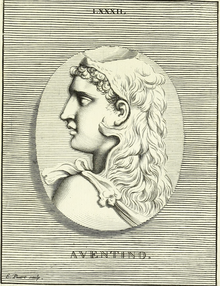
Aventinus was a son of Hercules and the priestess Rhea mentioned in Virgil's Aeneid, Book vii. 656, as an ally of Mezentius and enemy of Aeneas (Dryden's translation):
Next Aventinus drives his chariot round
The Latian plains, with palms and laurels crown'd.
Proud of his steeds, he smokes along the field;
His father's hydra fills his ample shield:
A hundred serpents hiss about the brims;
The son of Hercules he justly seems
By his broad shoulders and gigantic limbs;
Of heav'nly part, and part of earthly blood,
A mortal woman mixing with a god.
For strong Alcides, after he had slain
The triple Geryon, drove from conquer'd Spain
His captive herds; and, thence in triumph led,
On Tuscan Tiber's flow'ry banks they fed.
Then on Mount Aventine the son of Jove
The priestess Rhea found, and forc'd to love.
For arms, his men long piles and jav'lins bore;
And poles with pointed steel their foes in battle gore.
Like Hercules himself his son appears,
In salvage pomp; a lion's hide he wears;
About his shoulders hangs the shaggy skin;
The teeth and gaping jaws severely grin.
Thus, like the god his father, homely dress'd,
He strides into the hall, a horrid guest.
Servius This passage speaks of an Aventinus, a king of the aboriginal inhabitants of Rome, who was killed and buried on the hill afterward called the Aventine Hill. This king may be conflated with the Aeneid figure or with Aventinus:
- "The Aventine is a hill in the city of Rome. It is accepted that it derives its name from birds (aves) which, rising from the Tiber, nested there, as we read in the eighth book of a suitable home for the nests of ill-omened birds. This is because of a king of the Aboriginal Italians, Aventinus by name, who were both killed and buried there - just as the Alban king Aventinus was, he was succeeded by Procas. Varro, however, states that amongst the Roman people, the Sabines accepted this mountain when it was offered to them by Romulus, and called it the Aventine after the Aventus river in its area. It is therefore accepted that these different opinions came later, for in the beginning it was called Aventinus after either the birds or the Aboriginal King: from which it is accepted that the son of Hercules mentioned here took his name from that of the hill, not vice versa."
This Aventinus (the son of Hercules) is not mentioned elsewhere in classical literature.
Sources
References
- The only mentions of the Aventine in the Aeneid are VII.659, and VIII.231. Aventinus (satus Hercule pulchro) is mentioned only at VII.657.
- "Maurus Servius Honoratus, Commentary on the Aeneid of Vergil, SERVII GRAMMATICI IN VERGILII AENEIDOS COMMENTARIVS., VII.657 pulcher aventinus. Aventinus mons urbis Romae est, quem constat ab avibus esse nominatum, quae de Tiberi ascendentes illic sedebant, ut in octavo legimus "dirarum nidis domus opportuna volucrum" . quidam etiam rex Aboriginum, Aventinus nomine, illic et occisus et sepultus est, sicut etiam Albanorum rex Aventinus, cui successit Procas. Varro tamen dicit in gente populi Romani, Sabinos a Romulo susceptos istum accepisse montem, quem ab Avente, fluvio provinciae suae, Aventinum appellaverunt. constat ergo varias has opiniones postea secutas, nam a principio Aventinus est dictus ab avibus vel a rege Aboriginum: unde hunc Herculis filium constat nomen a monte accepisse, non ei praestitisse. insigne paternum absolute dixit".